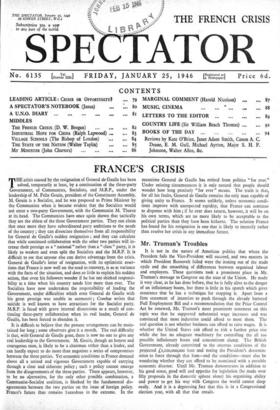FRANCE'S CRISIS
M. Gouin is a Socialist, and he was proposed as Prime Minister by the Communists when it became evident that the Socialists would not enter a two-party Government, with the Communist M. Thorez at its head. The Communists have once again shown that tactically they are the ablest of the three Government parties. They can claim that once more they have subordinated party ambitions to the needs of the country ; they can dissociate themselves from all responsibility for General de Gaulle's sudden resignation ; and they can calculate that while continued collaboration with the other two parties will in- crease their prestige as a "national" rather than a " class " party, it is likely to weaken and even split the Socialists and the M.R.P. It is difficult to see that anyone else can derive advantage from the crisis. General de Gaulle's letter of resignation, with its optimistic asser- tions that France is now well on the road to recovery, is so at variance with the facts of the situation, and does so little to explain his sudden action, that even his followers wonder if he has not shirked responsi- bility at a time when his country needs him more than ever. The Socialists have now undertaken the responsibility of leading the Government, under difficulties which even General de Gaulle with his great prestige was unable to surmount ; Combat writes that suicide is well known to have attractions for the Socialist party. M.R.P. is faced with grave internal dissensions as a result of con- tinuing three-party collaboration when its real leader, General de Gaulle, has been forced to abandon it.
It is difficult to believe that the present arrangement can be main- tained for long ; some observers give it a month. The real difficulty is that, with General de Gaulle gone, there is now no one to give any real leadership to the Government. M. Gouin, though an honest and courageous man, is likely to be a chairman rather than a leader, and can hardly expect to do more than negotiate a series of compromises between the three parties. Yet economic conditions in France demand above all a united and vigorous Government capable of carrying through a clear and cOherent policy ; such a policy cannot emerge from the disagreements of the three parties. There appears, however, to be no alternative, for the only other possible combination, a Communist-Socialist coalition, is blocked by the fundamental dis- agreements between the two parties on the issue of foreign policy. France's future thus remains hazardous in the extreme. In the meantime General de Gaulle has retired from politics "for ever." Under existing circumstances it is only natural that people should wonder how long precisely "for ever" means. The truth is that, for all his faults, General de Gaulle remains the only man capable of giving unity to France. It seems unlikely, unless economic condi- tions improve with unexpected rapidity, that France can continue to dispense with him ; if he ever does return, however, it will be on his own terms, which are no more likely to be acceptable to the political parties than they have been hitherto. The solution France has found for his resignation is one that is likely to intensify rather than resolve her crisis in any immediate future.






























